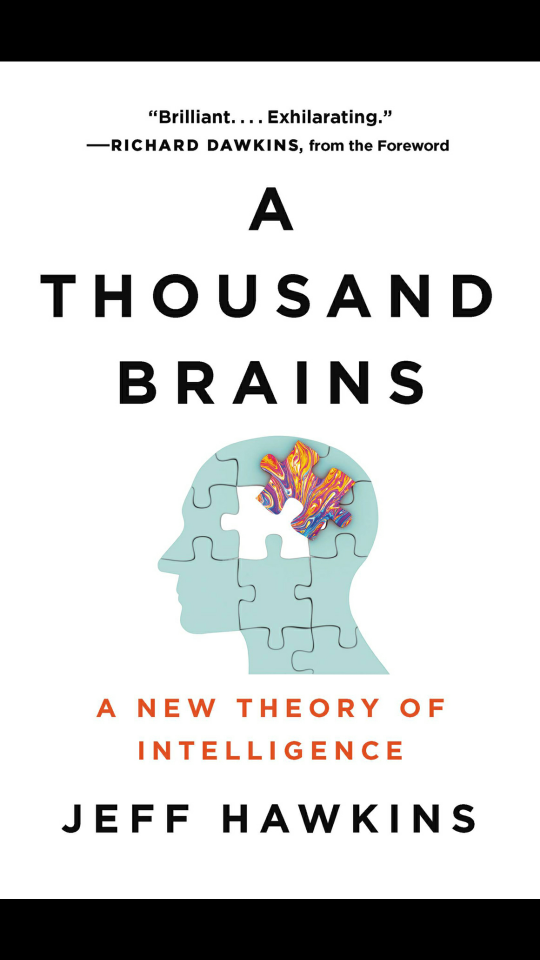Book review - A thousand brains by Jeff Hawkins
feed books neuroscience robotics AI intelligence computational ethology A review of A thousand brains by Jeff Hawkins

Brains and nervous systems are the most exciting and truly weird topics to discover.
They can be approached through neuroscience, ethology, psychology, cognitive science, arts, brain-inspired computing, and bio-inspired robotics.
Or, even in some other ways. Easy, because our own brain and CNS is involved in all our perception and acquisition of knowledge. It is involved in everything we are and do. It is us, and it is bodily (somatic) all the way down. This is called embodiment.
If the 20th century has seen the emergence of non-classical theory in physics, it has also seen the beginnings of non-classical theory in, ultimately, biology. Biology as the basis and substrate of the majority of intelligent behavior we are observing, anywhere.
Anyway, bla bla. Just finished reading “A thousand brains” by Jeff Hawkins, who you might know from Numenta, their papers, or from the earlier book “A new kind of intelligence”, which I haven’t read.
The work presented and discussed in the book is about the human neocortex, its computational mechanics, and its principles of organization.
What the brain does, in general, is to create models of the world, which it then uses to make predictions and find ways (sequences of actions) to get to goals (usually related to survival, in the broad sense of the complicated life’s of contemporary humans). This is called inverting a model.
In the book, the idea that these internal models don’t come in singular, but rather in a massively large bundle, a huge flock of models, is expounded and illustrated in clear and fun prose, including some pictures.
One of the weirdest things about the brain is the modelling decomposition. Sorry. I just love that word so much.
What is decomposition? I don’t mean the degenerative one. It is meant in the mathematical sense of decomposing something complex into a set of simpler things, together with an explanation of their interactions, so that the overall story will yield the original phenomenon.
Most of us will have an acquired and consciously accessible decomposition of the world in our heads, called a mindset. Usually that’s objects, persons, domains; interactions come via force and gravity, light, sound and touch, inner focus and sociality, etc;
So the cool thing that the brain does, is a) to decompose the world into a soup of models, and b), that this decomposition is mostly and unconsciously completely different and utterly alien to our own introspective thinking. It just doesn’t align. No, it doesn’t. The objects of conscious introspective thought are just the tip of the iceberg, of all unconscious mental and neural activity, not available to introspection.
One of the reasons that this is so is somatics, properties of a physical body that needs to compute in a physical universe, governed by energy equations, metabolics, and distribution networks. Limitation as a resource. Work that.
The story of the relationship between the subjective introspection experience of feeling and living, and objective neural mechanics is one of the most pressing issues in science communication.
Why? Because understanding our own behavior and decision mechanics is essential for our civilization to survive the 21st century. Period.
Hawkins’ book throws a lot of stepping stones out into our path through a foggy toxic lava swamp. Highly appreciated and recommended.
Go check on book home
Comments
tag cloud
robotics AI music books research psychology intelligence feed ethology computational startups sound jcl audio brain organization motivation models micro management jetpack funding dsp testing test synthesis sonfication smp scope risk principles musician motion mapping language gt fail exploration evolution epistemology digital decision datadriven computing complexity algorithms aesthetics wayfinding visualization tools theory temporal sustainability stuff sonic-art sonic-ambience society signal-processing self score robots robot-learning robot python pxp priors predictive policies philosophy perception organization-of-behavior open-world open-culture neuroscience networking network navigation movies minecraft midi measures math locomotion linux learning kpi internet init health hacker growth grounding graphical generative gaming games explanation event-representation embedding economy discrete development definitions cyberspace culture creativity computer-music computer compmus cognition business birds biology bio-inspiration android agents action